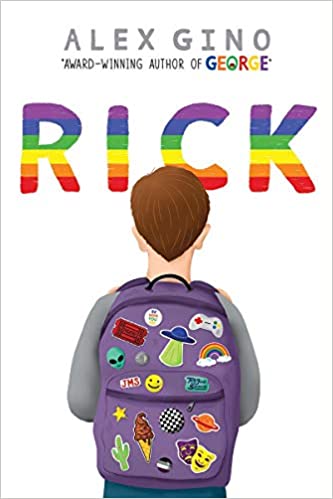Rick has just started secondary school along with his friend Jeff; they are assigned to separate form rooms. Diversity is a hot topic in his class and there is an LGBTQIAP+ group called Rainbow Spectrum which invites newcomers to attend and learn more about diversity. Rick is curious and would like to attend but Jeff belittles the group and defaces the posters advertising the meetings. So Rick feels compelled to invent an Origami class after school (seems even more unusual than going to diversity club to me!) in order to attend the Rainbow Spectrum meeting without Jeff finding out.
The more Rick thinks about his friendship with Jeff, the more uncomfortable he feels remaining friends with someone who holds such opposing views to him. His curiosity about his own sexuality is something he doesn’t feel he can discuss with Jeff or with his parents. Fortunately he discovers that he can talk to his grandfather, who gives him sage advice and shares a little about his life when he was younger. Like his now deceased grandmother, Rick also shares a love of old SciFi tv series with his grandfather and learns of his grandparents’ forays into the world of comicons. As Rick gets to know his grandfather better he also learns to accept himself more and to stand up for what he believes in, both at school and at home.
This is a moving, sensitively handled account of one boy’s curiosity about sexuality and what it means to him. It provides a clear and simple explanation of the meaning of LGBTQIAP+ and uses the voices of characters in the story to explain what each means to them. However, the main plot tells the story of the breakdown of Rick and Jeff’s friendship, Rick’s newly discovered kinship with his grandfather and the progress of the fundraising cabaret planned by his new friends in the Rainbow Spectrum group.
This would be a useful complimentary text to use with year 6 alongside a topic on puberty, transition to secondary school and growing up. It is a pacy, easy read which would encourage lots of book chat and class discussion about diversity. It is also an enjoyable easy read for anyone 10 years old and above. While the terms used in the book may change over time, the sentiment of accepting people for who they are and how to handle judgmental attitudes is universal and will never date.
